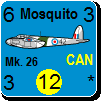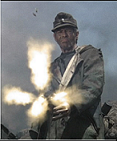Capt. Harlock
Posts: 5358
Joined: 9/15/2001
From: Los Angeles
Status: offline

|
150 Years Ago Today:
In London, the Foreign Secretary replied to the Prime Minister:
Gotha: September 17, 1862.
My dear Palmerston, - Whether the Federal army is destroyed or not, it is clear that it is driven back to Washington, and has made no progress in subduing the insurgent States. Such being the case, I agree with you that the time is come for offering mediation to the United States Government, with a view to the recognition of the independence of the Confederates. I agree further, that, in case of failure, we ought ourselves to recognise the Southern States as an independent State. For the purpose of taking so important a step, I think we must have a meeting of the Cabinet. The 23rd or 30th would suit me for the meeting.
We ought then, if we agree on such a step, to propose it first to France, and then, on the part of England and France, to Russia and other powers, as a measure decided upon by us.
We ought to make ourselves safe in Canada, not by sending more troops there, but by concentrating those we have in a few defensible posts before the winter sets in.
I hope to get home on Sunday, but a letter sent to the Foreign Office is sure to reach me.
Yours truly,
Lord Russell
In Kentucky, Braxton Bragg generously allowed the Union Colonel in command at Munfordville to tour his gun emplacements. Counting 46 cannon in the largest but by no means the only Confederate battery, the Northern commander surrendered the town and its garrison of 4,000 men.
But the day is known for what happened near Sharpsburg, Maryland. McClellan's plan of attack was reasonable on paper. His thought was to overwhelm the Confederate left while making a diversionary attack over a bridge on the right. However, where Lee had not paid enough attention to security, McClellan paid too much. He gave his sub-commanders only their specific orders, rather than the overall plan. What might have been coordinated attacks did not happen, and the end result was essentially three separate actions.

Map by Hal Jespersen, www.cwmaps.com
In the morning, "Fighting Joe" Hooker's bluecoats attacked the Confederate left, which was largely camped in a cornfield next to a small "Dunker" church. The Union artillery went first, pounding the cornfield with shell and grapeshot and inflicting serious losses. Hooker later reported 'In the time I am writing, every stalk of corn in the northern and greater part of the field was cut as closely as could have been done with a knife, and the slain lay in rows precisely as they had stood in their ranks a few moments before.' But there were still enough men to put up a fight against the Federal infantry attack that followed, and the Rebels were reinforced by a brigade of Texans under John Bell Hood. The Texans had fallen out to cook their first decent meal in three days when the urgent call had come. Understandably, they were enraged, and they took it out on the Yankees they held responsible. From then on, it became a furious see-saw battle, with each side feeding in reserves:
"Before the corn were open fields, beyond which was … the Dunkard church. As we appeared at the edge of the corn, a long line of men in butternut and gray rose up from the ground. Simultaneously, the hostile battle lines opened a tremendous fire upon each other. Men, I can not say fell; they were knocked out of the ranks by dozens. But we jumped over the fence, and pushed on, loading, firing, and shouting as we advanced. There was ... eagerness to go forward, and a reckless disregard of life, of everything but victory. . .
Men and officers of New York and Wisconsin are fused into a common mass, in the frantic struggle to shoot fast. Every body tears cartridges, loads, passes guns, or shoots. Men are falling in their places or running back into the corn. The soldier who is shooting is furious in his energy. The soldier who is shot looks around for help with an imploring agony of death on his face...
Another line of our men came up through the corn. We all joined together... The men are loading and firing with demoniacal fury and shouting and laughing hysterically, and the whole field before us is covered with rebels fleeing for life, into the woods. We push on over the open fields half way to the little church. The powder is bad, and the guns have become very dirty. It takes hard pounding to get the bullets down, and our firing is becoming slow. A long and steady line of rebel gray, unbroken by the fugitives who fly before us, comes sweeping down through the woods around the church. They raise the yell and fire. It is like a scythe running through our line. "Now, save who can." It is a race for life that each man runs for the cornfield.
-- Major Rufus R. Dawes, 6th Wisconsin Volunteer Infantry.
(Dawes served with the Army of the Potomac from Bull Run to the Siege of Petersburg. After the war, Dawes returned to a number of the battlefields he had fought on -- but never Antietam.)
Neither side could break through, and after four hours of slaughter, Rebel and Yankee were too exhausted to continue in that sector. When asked by a fellow officer where his division was, Hood replied, "Dead on the field."
At 10:00 a.m. the Union corps under General Sumner attacked Lee's center. The Confederates there were posted in a sunken road which provided an improvised but effective fortification, which is now known to history as Bloody Lane. Instead of back-and -forth charges and counter-charges, here the Confederates stood and for a time held off repeated assaults by the Federals. The cost was staggering for both sides, and each called for reinforcements.
Eventually one Rebel unit misundertood an order and pulled back from its position. The Yankees dashed up to the spot, and found that they could now deliver an enfilading fire down virtually the entire length of Bloody Lane. What had been a strong point now became a death-trap. The Confederate survivors fell back, and the center of Lee's postion had been broken. And by this time Lee had committed his last reserves of infantry.
At this moment of crisis, James "Old Pete" Longstreet stepped up. He sent every cannon he could find into line, even holding the horses of the cannoneers and correcting the ranges himself when their spotters went down. The cost was heavy, for the veteran Union artillerists quickly started a powerful counter-battery fire, but the advancing Union infantry hesitated. General D.H. Hill seized the moment, and called for volunteers for a counter-charge. No one stepped up until Hill himself grabbed a musket and went forward, and was followed by a mere two hundred men. They were driven back in a matter of moments, but the Federal advance stopped -- and did not start up again.
A full corps under Fitz-John Porter was ready to exploit the break in the Southern lines, which might very well have meant the destruction of Lee's army and soon, the end of the Civil War. But, Porter is said to have told McClellan, "Remember, General, I command the last reserve of the last Army of the Republic." Those were the exact words to make McClellan hold off, and that is what he did. By 2:00 the fighting in the center had sputtered out, leaving nearly 6,000 men dead and wounded at Bloody Lane.
To the south, Ambrose Burnside had taken nearly the entire day to solve the problem of getting his men on the other side of the bridge and to the crest of the hill beyond. For once, McClellan got a taste of his own medicine: his repeated orders to Burnside to attack were obeyed half-heartedly, and with much delay. At last, a straight-on charge across the bridge plus other units wading across lower down brought Burnside's Yankees to a position ready to advance on the Confederate left. Most of the men there had been sent off in the desperate attempts to save the Cornfield and Bloody Lane, but the remaining Southerners fired furiously:
“…As the range grew better, the firing became more rapid, the situation desperate and exasperating to the last degree. Human nature was on the rack, and there burst forth from it the most vehement, terrible swearing I have ever heard. Certainly the joy of the conflict was not ours that day. The suspense was only for a moment, however, for the order to charge came just after. Whether the regiment was thrown into disorder or not, I never knew. I only remember that we rose and started all the fire that had been held back so long was loosed. In a second the air was full of the hiss of bullets and the hurtle of grape-shot. The mental strain was so great that I saw at that moment the singular effect mentioned, I think, in the life of Goethe on a similar occasion - the whole landscape for an instant turned slightly red."
-- David Thompson, 9th New York Volunteers
Now Lee's army was in grave danger. The charge to the flank and rear could have rolled up the entire position, and left north as the only direction to retreat, after which starvation would be only a matter of time. The Southerners desperately needed reinforcements -- and Lee had none to give. But in one of the most dramatic moments of the war, just then A.P. Hill's division arrived from Harpers Ferry. Hill had set out with 5,000 men, but had only 3,000 left in formation after marching 17 miles (28 km) as fast as he could get his men to move in the late-summer heat. They might not have been enough to do the job had a number not been wearing captured blue uniforms from Harpers Ferry. This allowed them to close with the Federals, and deliver close-up volleys that broke the Union lines and sent them back to the heights next to the bridge.
Nearly one-third of McClellan's army had not fired a shot. But the units that had engaged on both sides were stunned by the losses they had suffered. The fighting was over by 5:30 p.m. even though there was still daylight. The Union had sustained at least 2,100 dead, 9,500 wounded, and 750 missing. The Confederates had lost over 1,500 dead, 7,700 wounded and 1,100 missing. This gives a total of roughly 23,000 casualties including 3,600 killed. Yet, the positions of the two armies were little different from what they had been at the beginning of the day.
Surpassing even Pearl Harbor or 9/11, Antietam remains the greatest one-day loss of American life in history. May the record never be broken.
 Attachment (1) Attachment (1)
< Message edited by Capt. Harlock -- 9/17/2012 4:47:54 PM >
|
 Printable Version
Printable Version






























 New Messages
New Messages No New Messages
No New Messages Hot Topic w/ New Messages
Hot Topic w/ New Messages Hot Topic w/o New Messages
Hot Topic w/o New Messages Locked w/ New Messages
Locked w/ New Messages Locked w/o New Messages
Locked w/o New Messages Post New Thread
Post New Thread